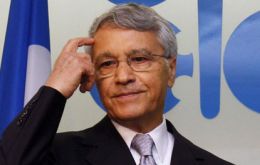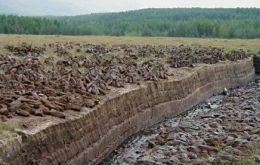MercoPress. South Atlantic News Agency
Energy & Oil
-
Wednesday, November 26th 2008 - 20:00 UTC
Oil Co. completes benthic sampling in South Falkland basin

Borders & Southern has completed its benthic sampling program within its South Falkland Basin licenses offshore the Falkland Islands, according to a report from the London based company released Wednesday.
-
Monday, November 24th 2008 - 20:00 UTC
North Falkland basin prospects of 4.3 billion barrels

NORTH Falkland Basin oil and gas exploration company Rockhopper Exploration have announced prospects of over four billion barrels of oil and gas.
-
Monday, November 24th 2008 - 20:00 UTC
Russia to drill for oil in deep Gulf of Mexico Cuban waters

Russian oil companies could soon begin searching for oil in deep Gulf of Mexico waters off Cuba, a top diplomat said just days before Russian President Dmitry Medvedev visits the island.
-
Friday, November 21st 2008 - 20:00 UTC
Magallanes ten years of growth based on energy projects

In spite of the global recession and the international gloomy atmosphere, Magallanes region in the extreme south of Chile has been forecasted ten years of 6.3% annual average growth speared by investments in energy related projects.
-
Wednesday, November 19th 2008 - 20:00 UTC
OPEC president says members have lost 700 billion USD

With Deutsche Bank forecasting a barrel of oil at 40 USD in 2009, Opec president Chakib Khelil said members of the cartel have lost about 700 billion US dollars because of falling crude prices.
-
Sunday, November 16th 2008 - 20:00 UTC
Iran pushing for oil cut of 1.5 million bpd in Cairo meeting

Iran's OPEC governor, Mohammad Ali Khatibi, is calling on the oil cartel to cut production by a further 1 to 1.5 million barrels per day when it meets in Cairo later this month.
-
Thursday, November 13th 2008 - 20:00 UTC
Oil industry restates interest in Falklands' potential

Phyl Rendell, Falkland Islands Director of Minerals and Agriculture attended the International AAPG (American Association of Petroleum Geologists) in Cape Town, South Africa.
-
Tuesday, November 11th 2008 - 20:00 UTC
Oil below 60 US dollars; OPEC ponders further cuts

While the price of crude oil for future delivery declined below 60 US dollars a barrel, OPEC sources on Tuesday said that the cartel will again consider cutting production when it meets next month in Algiers.
-
Monday, November 10th 2008 - 20:00 UTC
South Chile reviews peat potential as alternative energy

Magallanes and Los Lagos regions in the extreme south of Chile are looking into the possibilities of developing vast resources of peat in the area. Magallanes has an estimated 2.2 million hectares of peat and peaty soil which is equivalent to 17% of that territory.
-
Monday, November 10th 2008 - 20:00 UTC
UK becomes world leader in offshore wind generation

Wind farms off the Skegness coast in east England have helped make the Unite Kingdom since November the leader in offshore wind generation. The Lynn and Inner Dowsing farms are located 5 kilometres east of Skegness and when fully commissioned will transfer 194 megawatts of power to the national grid.
